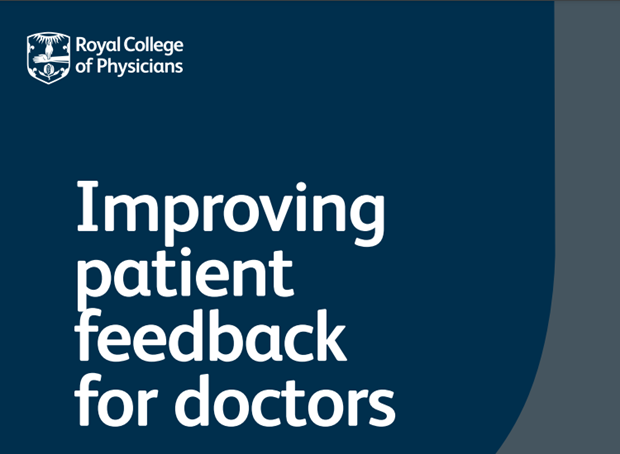
Since 2012, doctors in the UK have been required to undergo a process of "revalidation" every five years. Many other clinical professions have similar requirements.
Patient feedback is one of the core requirements of medical revalidation. Typically, such feedback is sought from a small selected sample of patients, via a survey, once in each five year period. Many doctors and patients regard the existing approach as tokenistic and of little value.
In 2017 the GMC published the Pearson Report (Taking Revalidation Forward), which argued for “a broader definition of feedback which harnesses technology and makes the process more real time and accessible to patients”. Pearson noted that:
- “Appraisers were felt to place too much focus on the volume of patient feedback obtained as opposed to the quality of a doctor’s reflection and learning.”
- “Patients would like the opportunity to provide feedback online or via social media.”
In response to the Pearson Report, the Royal College of Physicians (RCP) was asked by the Academy of Medical Royal Colleges to explore the perspectives of doctors and patients on how the patient feedback element of revalidation might be developed further.
Following a series of workshops with stakeholders, the RCP published Improving patient feedback for doctors in 2018, which suggested:
- “Feedback… should happen often, with sufficient numbers, and as reasonably close as possible to the time of clinical contact.”
- “Lack of coherent infrastructure for feedback to take place… has created a disproportionate burden for doctors and led to difficulties with the distribution, collection, analysis and reporting.”
- “Harnessing opportunities provided by advancing sophistication of IT and learning from providers of web-based platforms that already collect patient feedback is essential.”
The RCP report also noted how Care Opinion data visualisations are valuable in highlighting the positive and negative themes in narrative patient feedback.
How should patient feedback for revalidation change?
From both doctors and patients, there was a strong sense in the RCP report that a new approach to feedback should:
- Become continuous rather than episodic
- Be simple to use, for doctors and patients alike
- Be online and real-time, where possible
- Emphasise learning and improvement over measurement
- Give narrative feedback at least as much status as quantitative feedback
- Recognise that patients may wish to feedback on aspects of care not directly attributable to the doctor
- Enable doctors to respond to feedback while preserving doctor and patient safety
- Enable reporting, analysis and data sharing for low effort
How Care Opinion might help
Care Opinion was not built for revalidation. Our mission is focused more on the needs of patients and carers than the needs of professional regulation. But it is clear from the themes of the RCP report that Care Opinion might have something valuable to offer.
Many of the needs expressed by doctors and patients are already standard in Care Opinion’s service, such as:
- Simplicity and accessibility, including for children, BSL users and people with cognitive impairments
- Safety for patients and staff
- The focus on narrative, response, learning and visible impact
- The ability to deal with feedback which spans multiple services or organisations
- Built-in reporting and data visualisation tools
Limitations of Care Opinion for personal clinician feedback
Because stories on Care Opinion become public, they must be moderated. A key principle is that feedback must not defame staff, so we remove staff names and other identifying features from statements critical of named staff.
The result of this is that clinicians may identify themselves in uncritical postings but will not usually be able to identify themselves in postings where they are criticised. This is unhelpful from the point of view of learning, improvement and revalidation.
A possible solution
To solve this problem, we have introduced a new feature: private invitation links. Feedback posted using a private invitation link can reach the clinician who invited it, even when their name does not appear in the feedback.
By using private invitation links, we may be able to achieve the best of both worlds: a feedback platform which is public and optimised for learning and change, and yet at the same time a safe way to seek personal feedback for revalidation.
Of course, this still needs to be proven in practice. We hope that some clinicians in subscribing organisations will want to test this out.
If you do, please let us know!
Can Care Opinion be used in clinical revalidation?
Can Care Opinion be used in clinical revalidation? https://www.careopinion.org.uk/resources/blog-resources/1-images/a78614bc31ed4a4f9c062d6cd50a5ef4.png Care Opinion 0114 281 6256 https://www.careopinion.org.uk /content/uk/logos/co-header-logo-2020-default.pngUpdate from Care Opinion
Posted by James Munro, Director of Research & Development, Care Opinion, on
Thanks for your feedback.
Response from Vi Gray, Professional Nursing Support , PCOP, Western Health & Social Care Trust on 11 Feb 2022 at 14:27
Interesting article James.This also useful for other professionals and I encourage i.e Nurses, AHPs and students to keep evidence of feedback received to use for revalidation,CPD, reflection and how it has helped them to implement changes and improving the patient, user experience
Vi Gray
Patient & Client Experience WHSCT Northern Ireland

